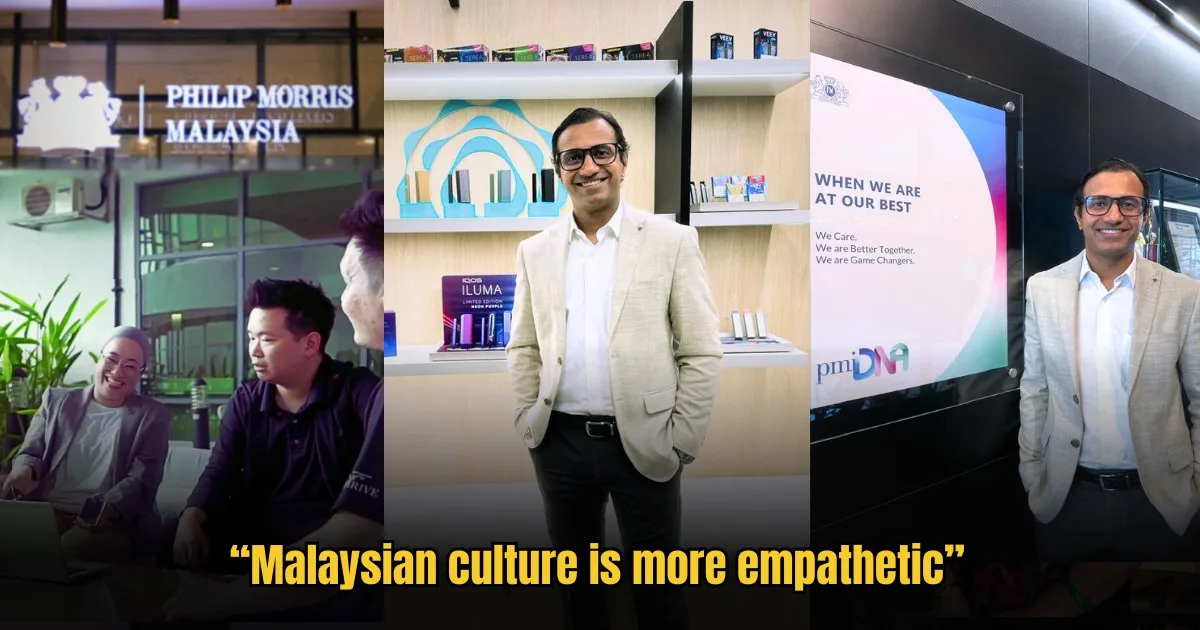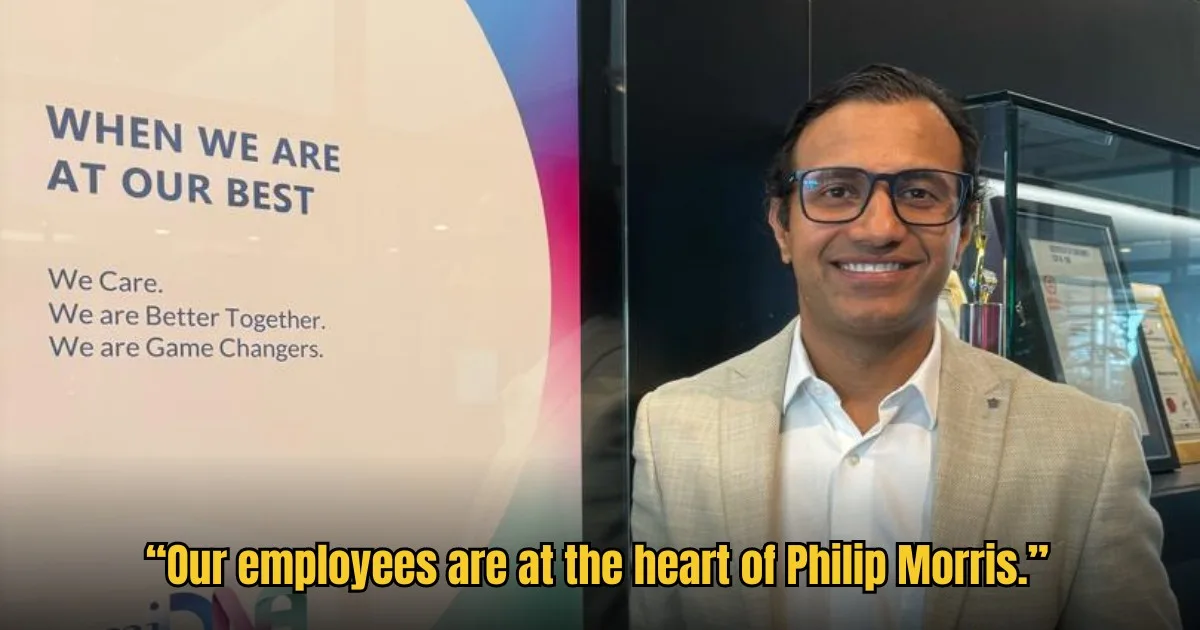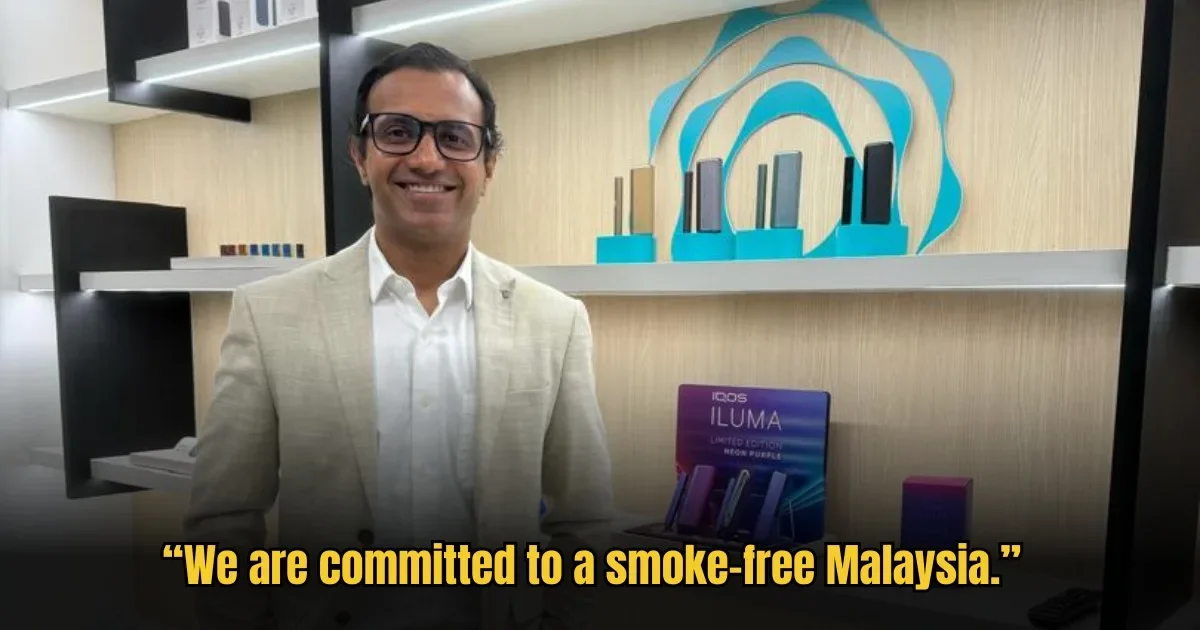Disclaimer: In Real Life is a platform for everyday people to share their experiences and voices. All articles are personal stories and do not necessarily echo the sentiments of In Real Life.

In this exclusive interview with IRL, Sunny Sharma, the Director of People & Culture of Philip Morris Malaysia shares his keen observations on Malaysian culture, insights on creating an award-winning company culture, and finally the company’s vision for creating a smoke-free Malaysia.
IRL: How would you describe Malaysian culture?
Firstly, Malaysians love food! There are so many different kinds of cuisines: From Nasi Lemak and Nasi Kandar to multiple fine dining options, you name it – they have it. Wherever you go, you can never die of hunger in Malaysia.
Secondly, it sounds a bit strange, but it usually lands as a compliment that Malaysia is much more developed than many have expected. Most people are very positively surprised at how modern Malaysia is. For example, the congestion is a breeze compared to other countries. It’s amazing how the country has managed to develop a lot of its infrastructure while keeping its nature mostly intact.
After living in KL for a few years, my take on Malaysian culture is that it’s very community-driven. Malaysians place a lot of stress and importance on relationships, community, and spending good quality time with each other.
People here are empathetic. They support each other, especially when someone is going through a tough challenge. They pay a lot of respect to each other’s convenience. It’s rare to see someone doing something that brings inconveniences to another person.
People here are also very aware of their external surroundings and how other people feel. This level of meaningfulness that people have in Malaysia is on the higher side compared to most of the cultures I’ve seen in different parts of the world.
IRL: How do you embody this sense of community and work-life balance at Philip Morris Malaysia?
Sunny: At Philip Morris Malaysia, we have very strong practices around work-life effectiveness. For some time now, we’ve moved away from the conventional way of measuring productivity.
We don’t have a tap-in, tap-out system, and everyone is free to manage their own time. We don’t track how many hours they’re spending in the office, how many meetings they’re attending, or how many days they come to the office. Another part of our company culture is not to hold meetings late in the evening or early in the morning. We also practise a 4.5 day working schedule, where Fridays are half-days for us.
We believe in trust, and that’s one of the cornerstones of our company culture DNA. We trust that people who are responsible in their respective areas will do that in the best possible manner. What we track is the business performance at an affiliate level – that is, the goals that people are supposed to deliver, and the accountability against those goals.
IRL: You mentioned a “company culture DNA” at Philip Morris Malaysia, what do you mean by that phrase?

Sunny: All this while, Philip Morris has always been known for having a very strong company culture. In the last 6 months, we have introduced and rolled out globally 3 different pillars about what the company culture represents, which we call our DNA:
- We Care. To be more inclusive, raising our level of self-awareness with each other.
- We are Better Together. Bringing in the feeling of collaboration, celebrating together and building trust in the organisation.
- We are Game Changers. Driving for impact and being agile, because the external landscape is always changing.
Prior to this, we had a set of 3 leadership principles: Consumer focused, forward-looking, and empowering people. Now it is very balanced; it’s no longer just focused on the business outlook, but on the real behaviours that we want our people to embody and bring to the office on a day-to-day basis.
IRL: How does Philip Morris manage the different generations (X, Y, Millennial, Z) among its employees?
Sunny: A lot of people have fallen into the trap of saying “Gen Z is more difficult to manage,” but we should not be stereotyping any one particular generation. What’s really important to understand is that each generation has a different motivation. What really motivates and inspires a particular generation may not be fully applicable to another generation.
For a long time, whether it’s talent management, performance management, or leadership development, we’ve been able to survive with a one-size-fits-all approach. But going forward, this will not work.
As an example, for Gen Y, a well-laid out career path is very important. They want to know how the company helps them achieve their 10-15 year goals down the line, and how much exposure they can get from training and career development.
With Gen Z, flexibility and having autonomy at work scores even higher than compensation. If I gave Gen Z a generous compensation but I didn’t provide them with a flexible environment, where they have autonomy to make big changes or see themselves learning new skills and continuously growing, they wouldn’t thrive in that environment.
Our HR and leadership practices have to be far more customised and attuned to the generational workforce that we’re dealing with. I wouldn’t call it a challenge per se; in fact, it’s not difficult to understand one particular generation when you consider their life stage and their motivations. At the end of the day, we are all human beings with motivations.
IRL: Can you share any success stories that highlight the positive impact of the company culture?
Sunny: The biggest example I can give is how we have created the “smoke-free” category from scratch. In 2014, Philip Morris International introduced the tobacco heating system (THS) in Nagoya, Japan as a city-pilot and launched nationwide in 2016. Following the introduction of heated tobacco products (HTP) from 2015 to 2016, cigarette sales began to substantially decline in each of the Japanese regions.
Why did cigarette sales decline in Japan? THS, commercialised as IQOS, has the potential to help adult smokers switch away from combustible cigarettes, and this was supported by many independent studies. Since then, we have led a transformation in the tobacco industry to create a smoke-free future and ultimately replace cigarettes with smoke-free products to the benefit of adult smokers.
Looking back from our current position, it might sound easy, but the level of change we are talking about was huge. Today, when you think of Philip Morris, you think of a smoke-free future.
That’s all thanks to the people here at Philip Morris who felt driven and motivated due to the culture of our organisation, the clarity and commitment displayed by leadership, and how every employee felt they were driving this change.
IRL: How is Philip Morris committed to a smoke-free future for Malaysia?

Sunny: Culture without a purpose will always play a very peripheral role. If you want the culture to come at the centre of the organisation, one needs to understand the role culture plays in driving the business. You can’t have culture as a “side character” while the business is in a completely different place.
For Philip Morris, when we delved into achieving a smoke-free future, we knew we had to be game changers, pushing the status quo, being more forward-looking in building a new category, and we asked ourselves, what’s the need of the hour? That “connect” has to be very clearly deciphered by the leadership, not just HR.
While the goal is for smokers to quit smoking entirely, if the smokers choose not to quit, then we give them the option to switch to better alternatives, rather than continuing using cigarettes.
What do you think of this story?
Submit your opinion to ym.efillaerni@olleh and you may be featured on In Real Life Malaysia.
Also read: Real People: How To Spot A Leader, A Follower, and A Rebel
More from Real People
‘A RM100 fee cost a company 5 years of revenue’ shares M’sian
This story is about a Malaysian who learned that bureaucracy can be defeated simply by not arguing with it.A billing …
‘I quiet-quit, upskilled, and tripled my salary,’ shares M’sian engineer
This story is about a Malaysian who learned that loyalty without leverage leads nowhere in the corporate world.After years of …
‘I did everything right, and it still wasn’t enough’ shares M’sian graduate
This story is about a Malaysian graduate navigating big dreams in a job market where a degree no longer guarantees …















